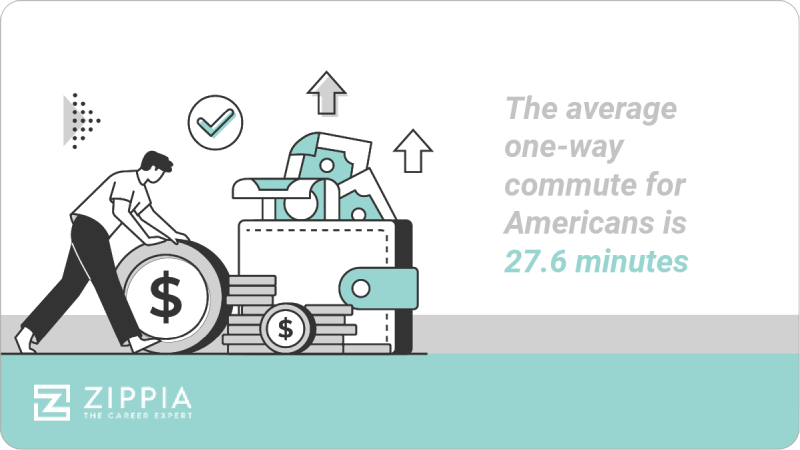How Long Will it Take You to Get to Work Everyday?

As you begin your career, one aspect you’ll most likely be dealing with is your commute to work.
And pending on where your job is located, that daily routine can add up to a decent amount of time throughout the week. Seriously, wait until you see some math further down in this article.
But no matter your form of transportation, it’s important you understand how long it takes you to get to work and optimize your time as much as possible.
In this article, I’m going to share some data about average commutes, what impacts your travel to work, and how to fix your commute times going forward.
The Average Commute in The United States
Before I get into a bit more about understanding how long it will take you to get to work, let’s dive into some math.
Sure, numbers and equations aren’t all that fun (unless you are a math nerd, then by all means geek out!), but these will certainly make your eyes pop open. And may even be surprising.
According to data from Zippia, the average American commute travel time to and from work is around 55 minutes.

And that number seems does vary around the world. For example, the United Kingdom averages about 27 minutes, whereas in Japan travel time is just over an hour!
But on average, about an hour of life is dedicated to being on the road in a car, bus, subway, or other means of transportation each day.
Now, do you really want to see the scary stuff?
Math based on the average
I like to put some things into more context here.
So let’s just use the average commute in the United States of 55 minutes. Here’s what that looks like assuming the traditional 5-day work week. I'm also not factoring in holidays observed or personal time off:
- 275 Minutes Per Week or 4.5 hours.
- 14,300 Minutes Per Year or 238 hours.
- 643,500 Minutes or 10,725 hours if you work for 45 years (working from 22 to 67).
And that 10,725 hours = 447 days.
Yes, you read that right. Over a year of your life is completely gone to commuting to your job.
Okay, so now if we factor in holidays, you have 260 working days of the year or 37 weeks. That math still equates to about 318 days of your life dedicated to commuting. A bit less than a year, but not far off!
I don’t know about you, but that is a lot of precious time in our short lives wasted being stuck in traffic or dealing with other drivers on the roads.
How Long Will it Take Me To Get to Work?
Although the math and numbers may scare you, I’m not quite done yet. Sorry! But don’t worry, I’ll get into some tips to fix your commute time in the next section.
So what you have to understand about how long it will take you to get to work is that there really is no standard.
We certainly can look at aggregate data and stats, as I described in the previous section. But every job is different and unique to your situation. Some people also work more than the traditional five days a week and some work less (like part-time or 4-day workweeks).
With that said, here are some of the common factors that will impact how long your travel time to work will be. You have to realize your travel time is only part of how long it really takes you to get to work.
Traffic in your area
You’ll certainly want to understand the traffic patterns in your routes to work. If you’ve lived in the area for a while, you probably have a good idea of travel times during morning and evening commutes. As well as which ways to avoid it.
However, you can also check GPS or news before leaving to ensure you don’t get caught in massive traffic due to an accident, construction, or bad weather.
Transportation method
How long it will take you to get to work is also influenced by the transportation method you choose. Pending where you live, certain options will be faster than others.
For example, while taking a car gives you more control, you might be close enough that you can avoid traffic and ride a bike.
Where you work
Naturally, where you are located in proximity to your employer will impact your commute. If you live outside the area or you have to be in different offices, you’ll want to take note of the travel time. It’s why people tend to relocate, so their commute is much better.
Route to work
Knowing a few different ways to get to work is valuable to know. This lets you find the fastest route or alternatives if there is traffic, construction, or an accident to avoid. But if you aren’t paying attention or checking traffic, this can add some time to your work travel.
Other responsibilities
Before you actually head off to work, you may have additional responsibilities to manage first. For example, parents may have to drop children off at school. This can impact your overall commute time and how early you need to leave so you are on time.
Your Commute is Fixable
Hopefully, your head isn’t spinning now that you saw some numbers and other factors that take up time in your day. But maybe it’s the wake-up call you needed!
Honestly, before I started working from home, I had no clue how much time I was wasting driving. Below are some tips to lessen your commute time (or even eliminate it completely).
Adjust your pre-work routine
Change your routine before you go to work. If that’s in the morning, then you can wake up early to give yourself more time to do other things.
One of the things about commuting is the time and energy suck, leaving you with not much motivation. Sometimes, just giving yourself more time before your commute can make it feel less draining.
Change your mode of transportation
Understandably, everyone has a different situation when it comes to how they get to work. Maybe you drive a car, take the bus, walk, ride your bike, etc. The options are endless!
But if you notice driving your car gets you stuck in bumper-to-bumper traffic a lot, then maybe riding a bike is more efficient (pending on how far your work is). Or maybe the public transportation you take has a few stops before it heads to the area of your workplace, so another alternative might be faster.
Time yourself and see what options might be quicker. It doesn’t have to be every day where you utilize an alternative, but it can help shave time off that commute.
Look for a job closer to your home
Easier said than done, but maybe it’s time to look for a new job that is closer to your home.
I know a few people who have almost two-hour commutes, just going one way! I know the job might be lucrative, but at what cost to your health and time lost?
The other benefit is the costs associated with your commute. Think about gas, wear and tear on your vehicle, or even public transportation costs.
Tip: You can use AI Jobs to find remote jobs in your town/city.

Work for yourself
Starting a business and working for yourself is not an easy alternative to a job.
But if the entrepreneurial spirit is within and you have a plan, working for yourself can eliminate or greatly reduce your commute.
Of course, this depends on what type of business you start. But many businesses can be run effectively from the comfort of your own home or even in a coworking space. Either way, since you are the boss, your commute is now up to you!
Switch to remote or hybrid work options
And my favorite option, look for a remote or hybrid job. There are many companies hiring remotely these days and more allow hybrid (work from home + in the office).
Why do I love this option? Well, let’s go back to some math again.
Even if your commute is shorter, say just 15 minutes each way (30 minutes total), that ends up being 150 minutes or 2.5 hours a week. Which is 130 hours per year roughly.
And if you work for 45 years, that’s 5,850 hours of your life wasted commuting or 243.75 days.
As you can see your 30-minute total commute can add up big time. It’s just one reason remote work is beneficial, you get time back to your life to do things that matter.
Even if you can’t go fully remote, just getting a few days a week to work from home helps remove wasted commute time. You can find ways to ask to work from home from your current employer or begin looking for a new remote job.








